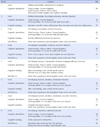Abstract
Purpose
The purpose of this study was to investigate the effect of laughter therapy and cognitive reinforcement program on self-efficacy, depression and cognitive functions of the elderly with mild cognitive impairments (MCI).
Methods
The study design was a non-equivalent control group pre and posttest design. Thirty-six subjects over the age of 65 with a diagnosis of mild cognitive impairment were assigned either to a treatment or a comparison group. Data were collected from February 7 to March 27, 2012 in the dementia supporting center. An eight week treatment program that included laughter therapy coupled with a cognitive reinforcing program including hand exercise, laughter dance routine, laughter technic and cognitive training for attention, memory, orientation and execution skill.
Results
MoCA-K (t=-6.86, p<.001) and Stroop test CW correct (t=-2.54, p=.008), self-efficacy (t=-3.62, p=.001) in the treatment group were significantly higher than those of the comparison group. Reported depression (t=2.29, p=.014), Stroop test CW error (U=53.50, p<.001) in the treatment group was significantly less than the comparison group.
Figures and Tables
References
1. Bandura A. Perceived self-efficacy in cognitive development and functioning. Educ Psychol. 1993; 28(2):117–148.

2. Belleville S, Gilbert B, Fontaine F, Gagnon L, Ménard E, Gauthier S. Improvement of episodic memory in persons with mild cognitive impairment and healthy older adults: Evidence from a cognitive intervention program. Dement Geriatr Cogn Disord. 2006; 22(5-6):486–499. DOI: 10.1159/000096316.

3. Chu SK, Yoo JH, Lee CY. The Effects of a cognitive behavior program on cognition, depression, and activities of daily living in elderly with cognitive impairment. J Korean Acad Nurs. 2007; 37(7):1049–1060.

4. Eun Y, Kang YS, Kim SY, Kim ES, Kim EH, Bae HJ, et al. Younger and energetic. Seoul: Hyunmoonsa;2002.
5. Faul F, Erdfelder E, Buchner A, Lang AG. Statistical power analyses using G-Power 3.1: Tests for correlation and regression analyses. Behav Res Methods. 2009; 41(4):1149–1160. DOI: 10.3758/BRM.41.4.1149.

6. Fonzi L, Matteucci G, Bersani G. Laughter and depression: Hypothesis of pathogenic and therapeutic correlation. Riv Psichiatr. 2010; 45(1):1–6.
7. Geem WT, Min KO. The effects of frontal lobe EEG activity pattern by Paul Dennison's Brain Gym. J Brain Educ. 2010; 5:1–26.
8. Han EG. Neuropsychological differentiation of cognitive aging and predictors of progression from mild cognitive impairment to alzheimer's disease. Gwangju: Chonnam National University;2010. Unpublished doctoral dissertation.
9. Han JH, Ko SK, Kwon JH, Jo IH, An SM, Han CS, et al. Efficacy of multifactorial cognitive ability enhancement program in MCI (Mild Cognitive Impairment). Korean J Clin Psychol. 2008; 27(4):805–821.
10. Jung IK, Kwak DI, Shin DK, Lee MS, Lee HS, Kim JY. A reliability and validity study of geriatric depression scale. J Korean Neuropsychiatr Assoc. 1997; 36:103–112.
11. Kim JA, Lee EH. A study on the effectiveness of a laughter therapy program for the mental health of the elderly. Korean J Fam Welf. 2012; 17(1):85–104.
12. Kim TY, Han SH, Kim SY, Han IW, Kim HG, et al. Neurocognitive therapy. Goyang: Seohyunsa;2010.
13. Ko HJ, Youn CH. Effects of laughter therapy on depression, cognition and sleep among the community-dwelling elderly. Geriatr Gerontol Int. 2011; 11(3):267–274. DOI: 10.1111/j.1447-0594.2010.00680.x.

14. Lee JH, Kang YW, Na DL. Efficiencies of stroop interference indexes in healthy older adults and dementiapatients. Korean J Clin Psychol. 2000; 19(4):807–818.
15. Lee JY, Lee DW, Cho SJ, Na DL, Jeon HJ, Kim SK, et al. Brief screening for mild cognitive impairment in elderly outpatient clinic: Validation of the Korean version of the montreal cognitive assessment. J Geriatr Psychiatry Neurol. 2008; 21(2):104–110. DOI: 10.1177/0891988708316855.

16. Lim JN. Effect of laughter theraphy on the elderly with cognitive impairment: Change of serum cortisol. In : Paper presented at the meeting of Korea Society of Laughter Clinic; December; Seoul. 2011.
17. Manly JJ, Tang MX, Schupf N, Stern Y, Vonsattel JP, Mayeux R, et al. Frequency and course of mild cognitive impairment in a multiethnic community. Ann Neurol. 2008; 63:494–506. DOI: 10.1002/ana.21326.

18. Ministry of Health and Welfare. Nationwide study on the prevalence of dementia in korean elders. Seoul: Seoul National University Hospital;2009. 04. Issue No. 11-1351000-000227-01.
19. Nasreddine ZS, Phillips NA, Bedirian V, Charbonneau S, Whitehead V, Collin I, et al. The montreal cognitive assessment, MoCA: A brief screening tool for mild cognitive impairment. J Am Geriatr Soc. 2005; 53(4):695–699. DOI: 10.1111/j.1532-5415.2005.53221.x.

20. Oh HS. Health promoting behaviours and quality of life of Korean women with arthritis. J Korean Acad Nurs. 1993; 23(4):617–630.
21. Perrino T, Mason CA, Brown SC, Spokane A, Szapocznik J. Longitudinal relationships between cognitive functioning and depressive symptoms among hispanic older adults. J Gerontol B Psychol Sci Soc Sci. 2008; 63(5):309–317. DOI: 10.1093/geronb/63.5.P309.

22. Petersen RC, Smith GE, Waring SC, Ivnik RJ, Tangalos EG, Kokmen E. Mild cognitive impairment: Clinical characterization and outcome. Arch Neurol. 1999; 56:303–308.
23. Sherer M, Maddux JE, Prentice-Dunn S, Jacobs B, Rogers RW. The self-efficacy scale:Construction and validation. Psychol Rep. 1982; 51:663–671.
24. Song MR, Kim EK, Yu SJ. A study of ADL, social support, self-efficacy between the aged groups with and without depression. Korean J Soc Welf Res. 2010; 24:61–80.
26. Teng E, Lu PH, Cummings JL. Neuropsychiatric symptoms are associated with progression from mild cognitive impairment to Alzheimer's disease. Dement Geriatr Cogn Disord. 2007; 24:253–259. DOI: 10.1159/000107100.

27. Wang MJ. The relations among ADL, self-efficacy, physical activity and cognitive function in Korean elders. J Korean Acad Community Health Nurs. 2010; 21(1):101–109.

28. Winblad B, Gauthier S, Scinto L, Feldman H, Wilcock GK, Truyen L, et al. Safety and efficacy of galantamine in subjects with mild cognitive impairment. Neurology. 2008; 70:2024–2035. DOI: 10.1212/01.wnl.0000303815.69777.26.

29. Woods RT, Clare L. Cognition-based therapies and mild cognitive impairment. In : Tuokko HA, Hultsch DF, editors. Mild cognitive impairment: International perspectives. New York: Taylor & Francis;2006. p. 245–264.




 PDF
PDF ePub
ePub Citation
Citation Print
Print






 XML Download
XML Download